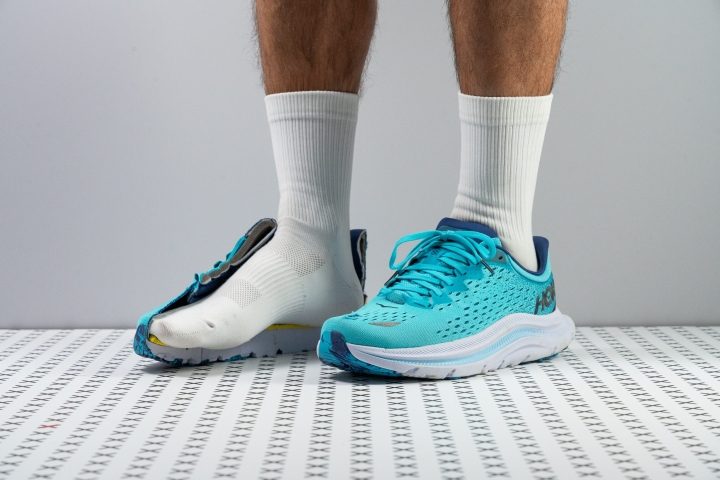Our verdict
Pros
- Exceptionally comfortable
- Secure fit
- Smooth and stable ride
- Protection hits the sweet spot
- Above average durability
- Versatile: running and gym
- Best-looking Hoka so far
Cons
- Not particularly lively
- Firmer than other Hokas
- Needs some breaking in
- Average-at-best grip
Audience verdict
- Top 10% most popular running shoes
Comparison
The most similar running shoes compared
Who should buy
We highly recommend the Hoka Kawana if you are looking for a reliable, comfortable, and durable shoe to wear on your next workout, whether it be a road run or a gym session.
In our opinion, versatility is one of the main reasons to buy the Kawana. You can take this shoe practically anywhere!
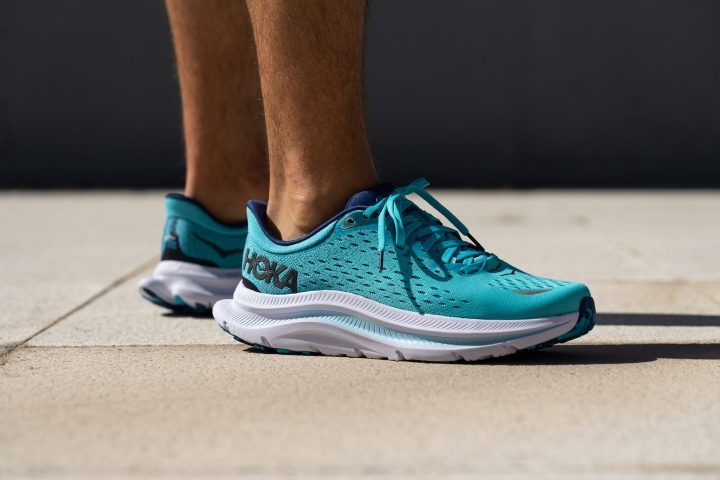
It is also perfect if you are a heel striker and for runners who need a touch more stability on their short easy runs.
Who should NOT buy
The Hoka Kawana is not ideal if you:
- like a very soft cushioning, in that case, Hoka Bondi 8 is a better choice
- want a dedicated runner that can do it all. Check out the Hoka Mach 5 instead
- overpronate and need a stability shoe: have a look at the Hoka Gaviota 5
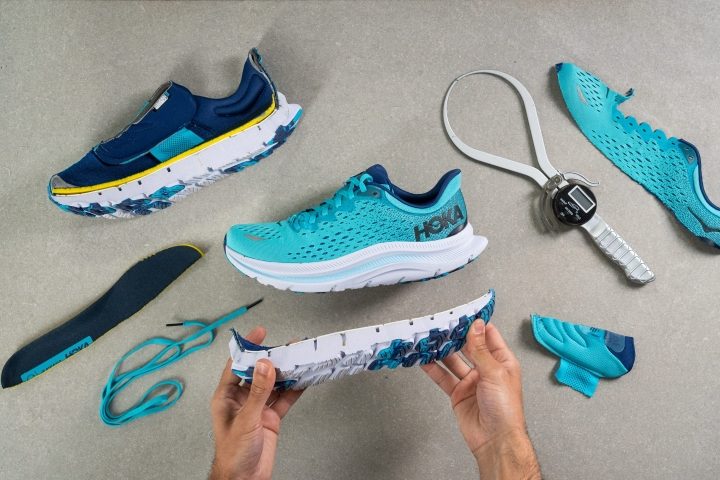
Breathability
We were happy to find out that this Hoka shoe is very well-ventilated!
Following our breathability test, we can confirm that the shoe proved our experience. It scored a 4 out of 5 in our assessment, which is better than the average shoe and surpasses nearly all other daily trainers on the market. And the video speaks for itself!
This shoe serves as a prime example of how to achieve excellent ventilation with a thick upper, demonstrating how a shoe can effectively handle both cold and hot weather conditions. As you can see, light doesn't pass through the upper material, so it will be warm in winter.
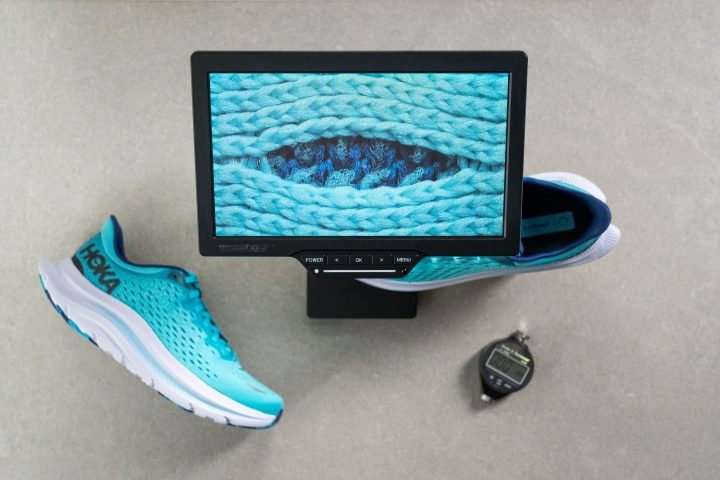
The mini-holes in the upper are strategically placed to promote airflow.
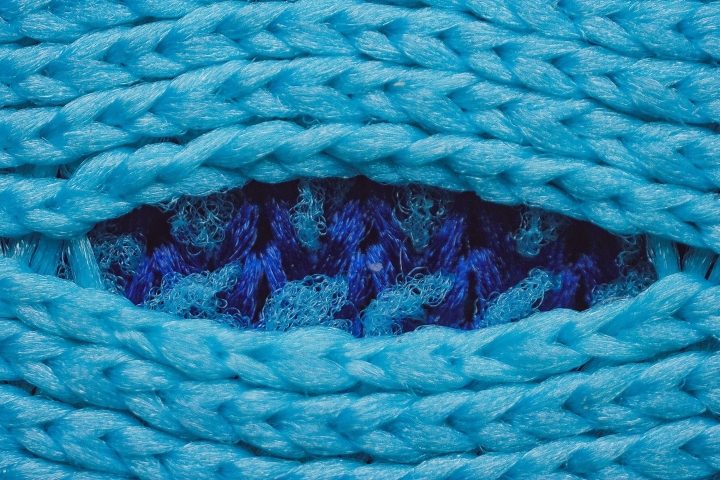
We loved this approach for a daily trainer. In contrast, this is Nike Streakfly's upper, which is also super-ventilated, but not great for winter runs.
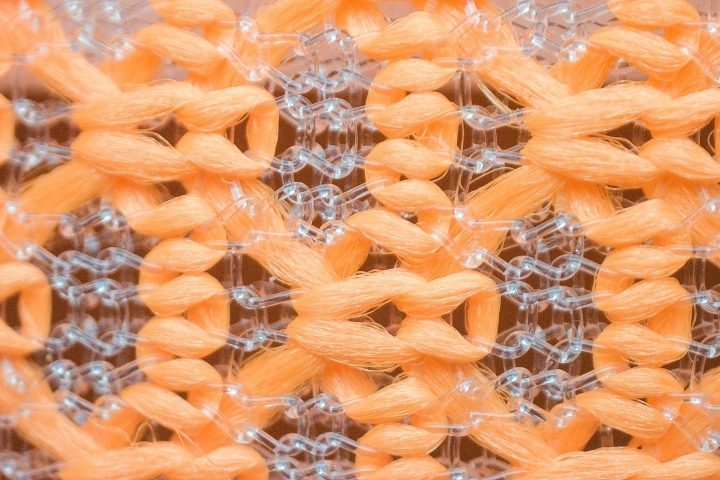
| Kawana | 4 |
| Average | 3.8 |
Durability
Toebox durability
The shoe's breathable and adequately padded upper made a very nice first impression. And what made it even better was the fact that Hoka achieved this level of comfort using recycled materials!
Unfortunately, this upper material failed to show wear resistance in our standardized Dremel test.
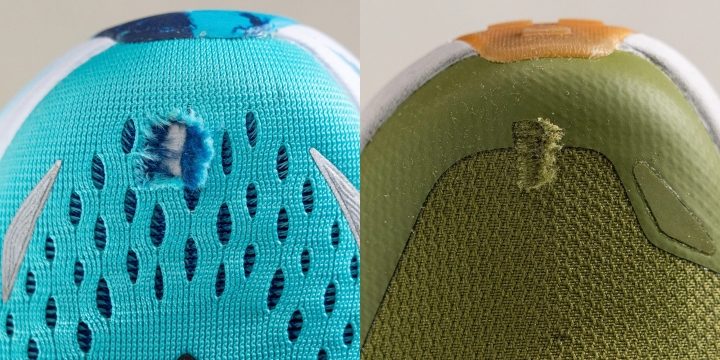
Hoka Kawana vs. Hoka Transport
Disclaimer: We apply the same force and RPM to every shoe for 4 seconds.
The results reveal that the Kawana's upper gives up and tears quite easily under the Dremel. That's why we rated it with the lowest score of 1/5 on our toebox durability test.
| Kawana | 1 |
| Average | 2.3 |
Outsole hardness
Despite its exposed foam, the Hoka Kawana proved to be fairly durable in the outsole.
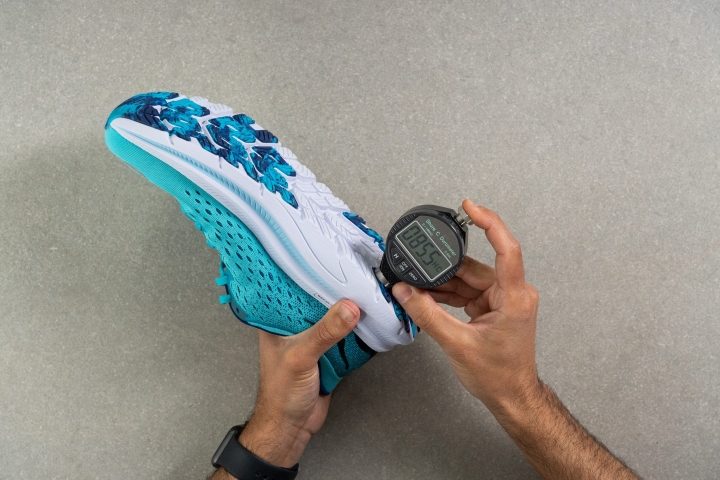
Measuring the shoe's rubber hardness with a durometer, we got 86.6 HC. That's some sturdy rubber! In comparison, it is 7% harder than the average road running shoe's rubber. And harder rubbers make for longer lives!
| Kawana | 86.6 HC |
| Average | 80.3 HC |
Outsole thickness
In an effort to reduce weight, the Kawana's outsole features a modest 2.9 mm height. Though it's 0.5 mm less than the average shoe, there's no cause for concern, thanks to the remarkable sturdiness of the rubber used in this shoe.
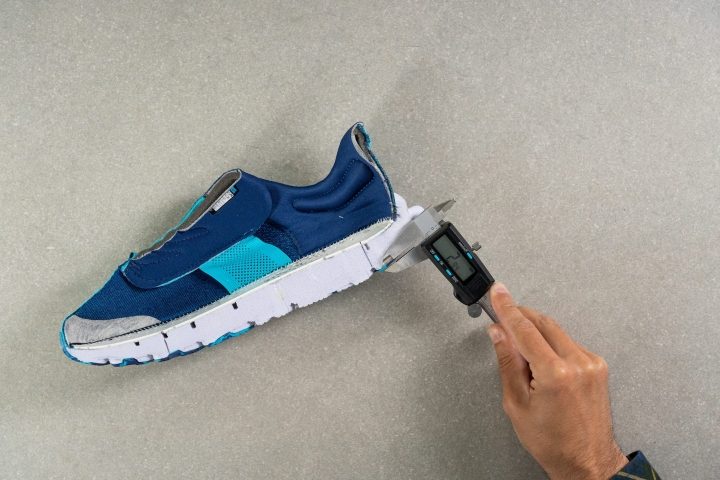
| Kawana | 2.9 mm |
| Average | 3.2 mm |
Weight
This is not the lightest shoe in the Hoka line, but it doesn't feel heavy when picking up the pace and it provides a good amount of protection underfoot.
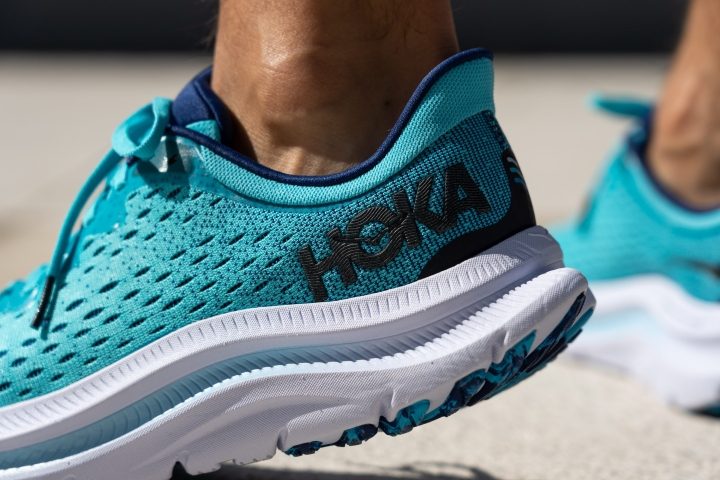
Weighing 10.7 oz (303g), we can confirm that this is not a light shoe. In fact, it's heavier than most of its competitors in the daily trainer category (by almost an ounce!). For instance, the uber-popular Pegasus 40 is a whole ounce lighter!
| Kawana | 10.69 oz (303g) |
| Average | 9.35 oz (265g) |
Cushioning
Heel stack
The official specs from Hoka say that the shoe's stack comes at 30 mm in the heel.
We carefully measured this shoe and discovered some discrepancies from the official specifications. Our caliper shows a 2.8 mm taller heel, which is 32.8 mm!
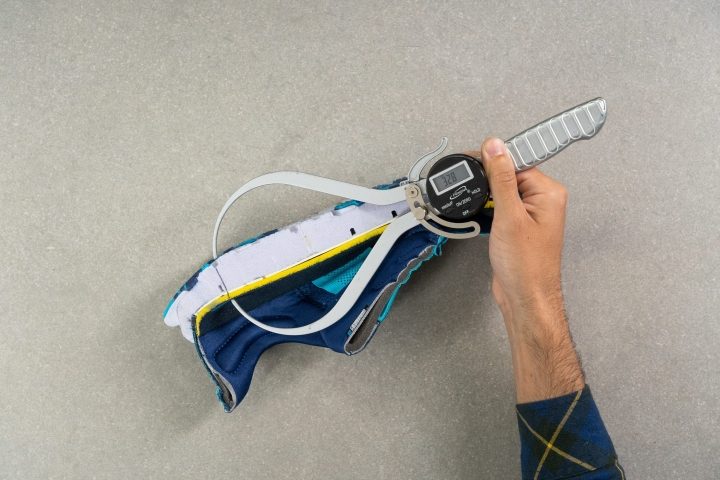
| Kawana | 32.8 mm |
| Average | 33.5 mm |
Forefoot stack
Our forefoot stack measurement also deviates from the official one - by 2.1 mm. Our caliper showed 27.1 mm instead of 25 mm.
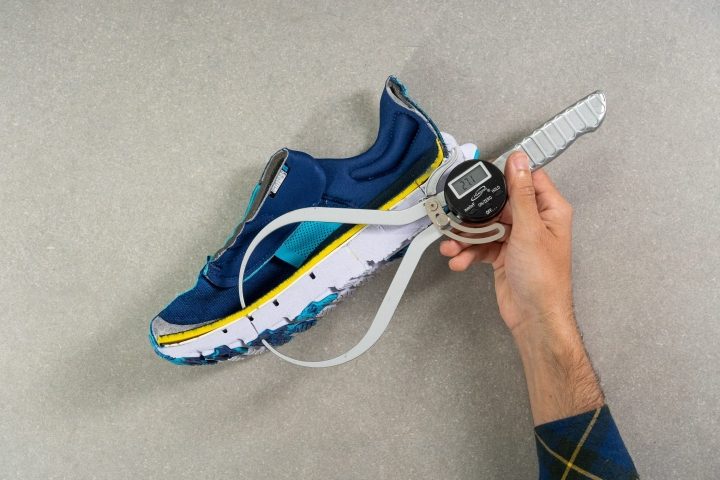
| Kawana | 27.1 mm |
| Average | 24.9 mm |
Drop
Hoka consistently leans toward lower drops, and the Kawana is no exception. According to the brand, it comes with a 5 mm drop.
But based on our own difference in stack measurements, it turns out to be 5.7 mm. Not too far off, luckily!
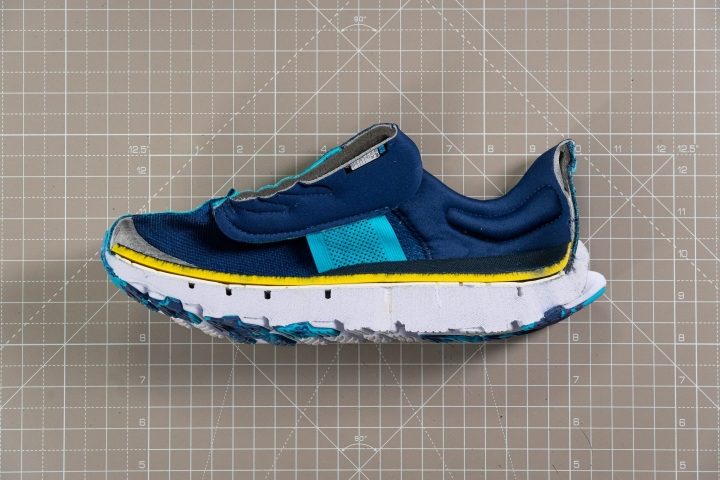
| Kawana | 5.7 mm |
| Average | 8.7 mm |
Insole thickness
The insole used in the Kawana is pretty standard though. With a heel thickness of 4.5 mm, it is exactly the same as the average.
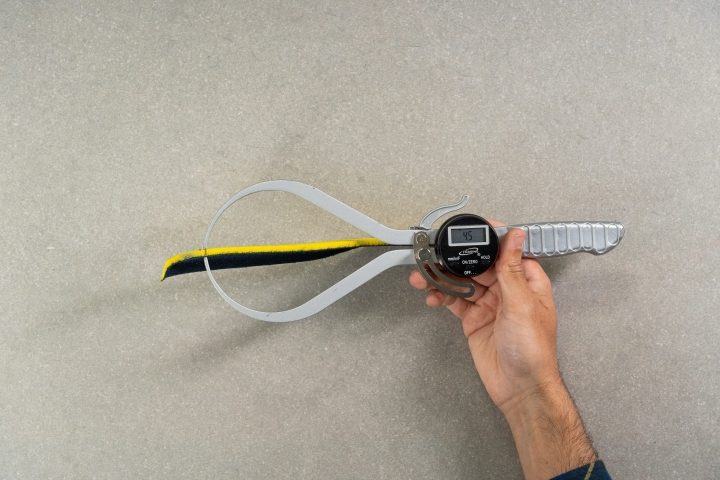
| Kawana | 4.5 mm |
| Average | 4.4 mm |
Midsole softness
Based on our perception only, the Kawana feels firmer than almost any other Hoka shoe. This is not your typical Hoka.
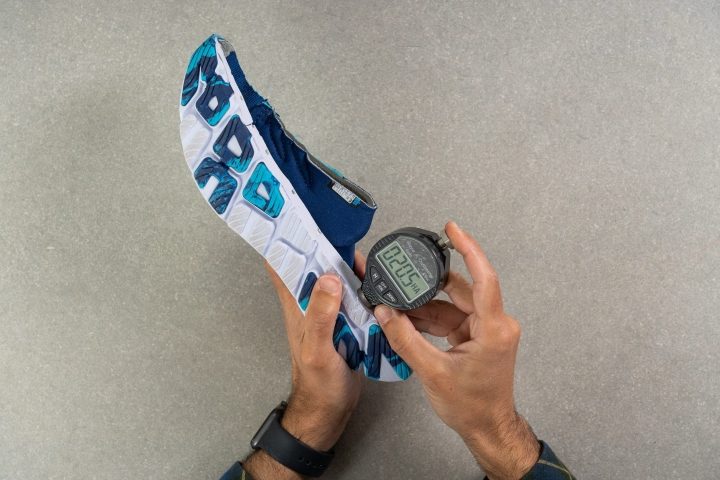
Measuring the shoe's midsole softness at 21.4 HA, we actually found that the Kawana sits at the average of Hoka running shoes. It is a touch firmer than the Bondi and the Clifton but it IS softer than the stability-oriented Arahi and Gaviota.
Also, keep in mind that this shoe took us a while to break in and offered its best only after a few runs. Just give it time, but remember it won't ever feel as soft as other Hokas.
| Kawana | 21.4 HA |
| Average | 21.3 HA |
Difference in midsole softness in cold
This shoe is great for winter running and it was a surprise, given that most Hoka running shoes tend to harden up too much under freezing temperatures.
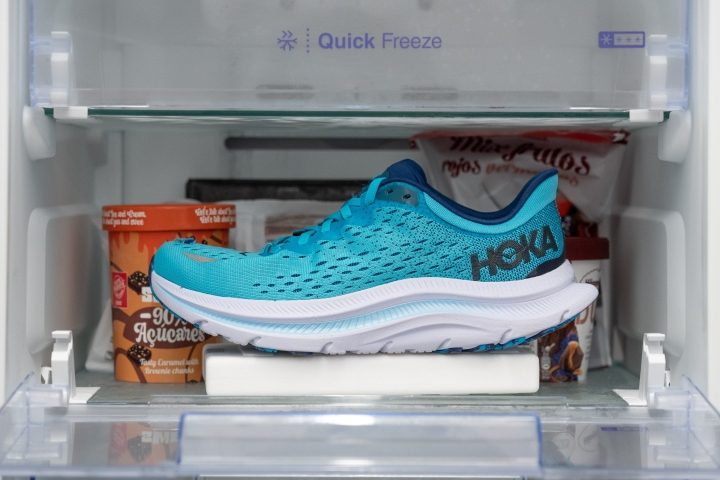
The Hoka Kawana's midsole hardens by only 26.7% after our freezer test. That's a favorable result for an EVA-based midsole in a Hoka shoe. For comparison, the Hoka Bondi 8 becomes 49.3% firmer, while the Hoka Mach 5 experiences a crazy 60.0% increase in firmness.
| Kawana | 26.7% |
| Average | 25.8% |
Ride
The shoe didn't offer much energy return or assistance in propelling us forward. This is understandable though since it's a hybrid road/gym shoe suitable for everyday training rather than long runs.
Stability
Lateral stability test
We love Hoka's unique swallowtail design which made the shoe's ride incredibly smooth and seamless.
We also found the benefit in its stiffness and stability, which makes the Kawana a good option for those who need a little more guidance.
Torsional rigidity
A moderate amount of stiffness in the shoe's platform is very helpful in making it feel more stable. In our manual assessment, we rated it as 3 out of 5 (where 5 is the stiffest).
| Kawana | 3 |
| Average | 3.2 |
Heel counter stiffness
The Kawana's heel counter adheres to the signature Hoka style. As a result, it is firmer than the typical daily running shoe, while still providing gentle and comfortable support for your heel. Additionally, it boasts a unique curvature that alleviates pressure on your Achilles tendon.
In our manual test, we rated the shoe's heel counter stiffness as 3 out of 5.
| Kawana | 3 |
| Average | 2.8 |
Midsole width in the forefoot
Hoka is renowned for its maximalist approach and its super-wide platforms to promote stability. Although the Kawana is not massive, it still offers a lot of real estate in its outsole—especially in the heel.
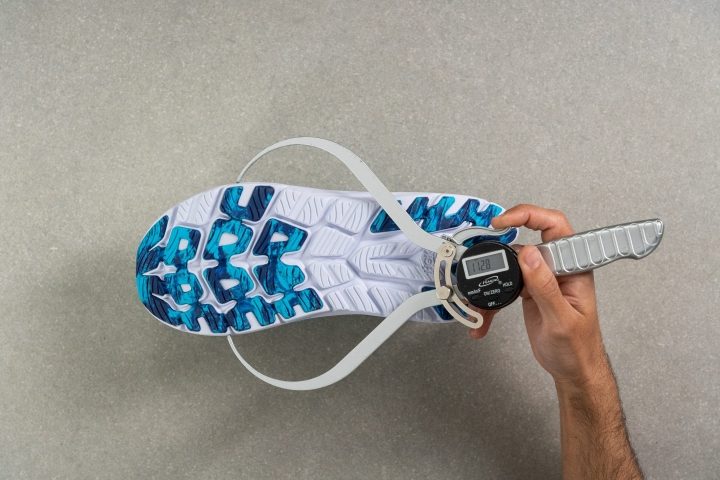
We measured 112.8 mm in the forefoot which is pretty average for a road shoe. But it is in the heel where the Kawana makes a difference.
| Kawana | 112.8 mm |
| Average | 113.5 mm |
Midsole width in the heel
The Kawana's sole is impressively wide in the heel! At 95.6 mm in its widest part, this Hoka shoe is 5.5 mm wider than average!
With its firm midsole and wide heel, the Kawana is a great shoe for any heel striker.
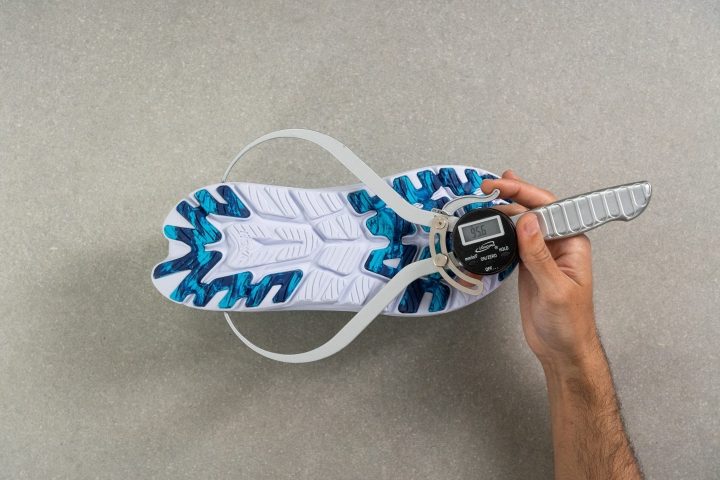
It is also 12.9% wider than a Pegasus 39 or 9.6% wider than a Nike Zoom Fly 5.
| Kawana | 95.6 mm |
| Average | 90.3 mm |
Flexibility
Stiffness
This shoe is a versatile all-rounder, which means it simply can't be too stiff. And the Hoka Kawana did not disappoint.
It only took a force of 21.4N to bend the Kawana to a 90º angle. That's 25.7% less than what was needed to bend a Clifton 9 and 42% less than it takes a road shoe on average!
So, it's confirmed: this is indeed a flexible shoe!
| Kawana | 21.4N |
| Average | 29.4N |
Difference in stiffness in cold
When it comes to flexibility and cold weather, the Kawana truly embodies the essence of a daily trainer, showcasing an average performance.
In fact, after putting it through our flex test in cold temperatures, its flexibility decreased by 42.3%, which is strikingly close to the average shoe tested in our lab at 43.6%. Talk about a close call!
| Kawana | 69.8% |
| Average | 37% |
Grip / Traction
We found the shoe's outsole to be efficiently grippy in most conditions, even though there is not much rubber at the bottom.
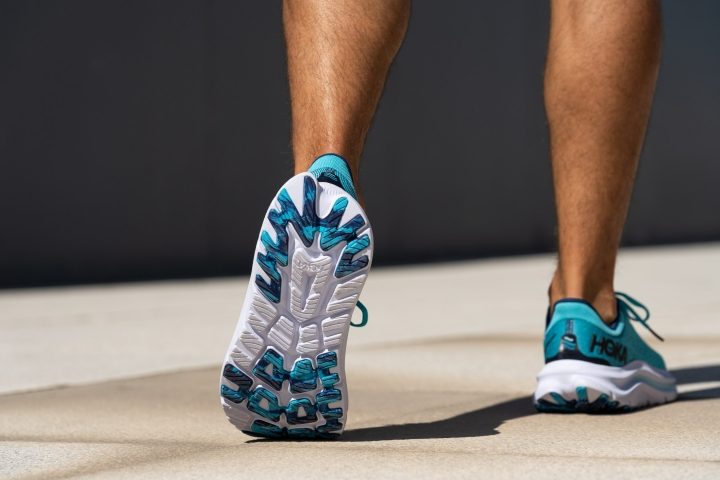
However, as the ground got wetter and more slippery, the Kawana proved to be less grippy than other Hokas like the also-versatile Rincon 3.
Size and fit
Toebox width at the widest part
The Hoka Kawana may not be the best shoe for runners with wide feet. It is better suited for those with narrow feet, and it can also work well for regular-width feet if a snug fit is preferred.
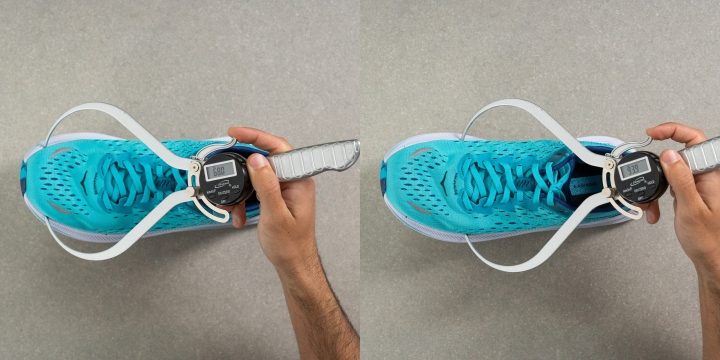
With a maximum width of 93.9 mm in the forefoot, this shoe is quite narrow compared to the average
| Kawana | 93.9 mm |
| Average | 98.3 mm |
Toebox width at the big toe
We also measured the Kawana to be narrow around the big toe. With a caliper reading of 68.0 mm, it is almost a centimeter narrower than average which shows its tapered shape.
| Kawana | 68.0 mm |
| Average | 78.0 mm |
Tongue: gusset type
This heavily padded tongue is also semi-gusseted which brings the shoe's lockdown to the next level. Not to mention that it makes the in-shoe experience feel premium!
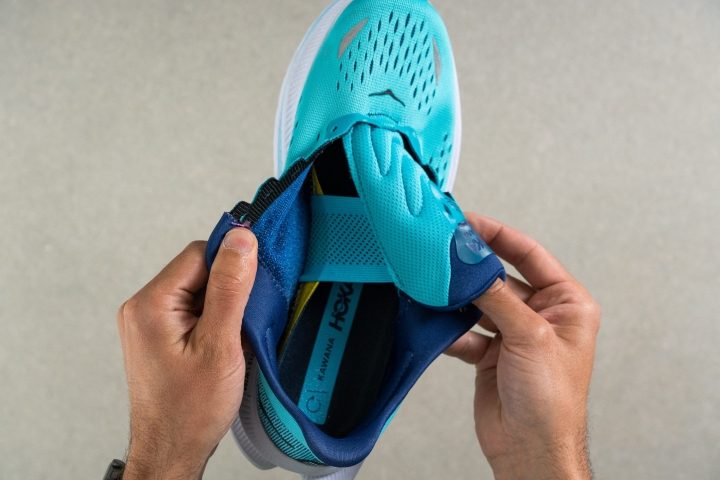
| Kawana | Both sides (semi) |
Comfort
Tongue padding
From the shoe's generously padded tongue to its pronounced Achilles pillows, the Kawana just screams comfort!
Upon closer examination in our lab, we can verify that the shoe's tongue is among the thickest we've encountered, measuring 11.6 mm!
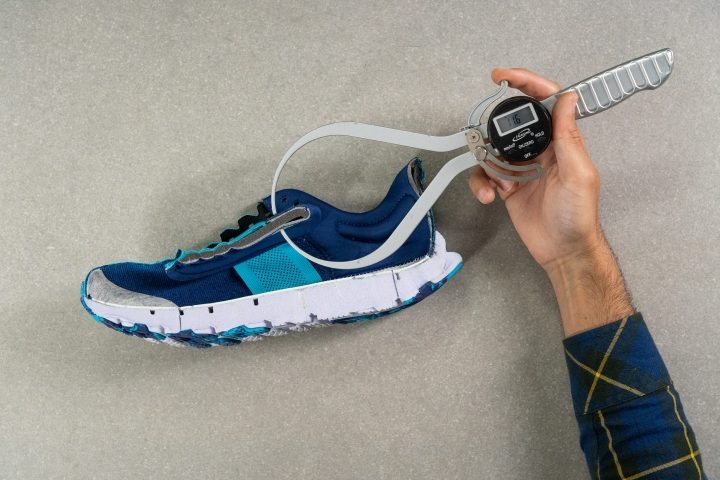
| Kawana | 11.6 mm |
| Average | 5.6 mm |
Misc
Reflective elements
In keeping with the overall theme of this running shoe, the reflective material is fairly average. While it doesn't provide visibility from great distances like the On shoe (right), it does have some reflective elements, unlike many shoes that lack this feature entirely.
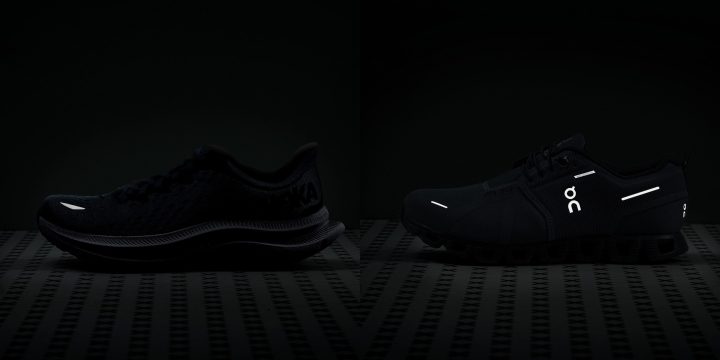
| Kawana | Yes |

